How Wedding Bells Ring in Pakistan? [Part 2]
I am rewriting this paragraph for the fourth time. I swear this will be the final version. The reason behind this indecisiveness - I was vacillating about how to narrate the wedding traditions of my country as promised in my last post. I thought to sweep you around with general details but nahh... that wouldn't have satisfied my urge for storytelling. I might not be good with stories but I think people tend to listen/read stories more attentively.
On that account, you probably need to sit down with a glass of your favourite beverage because I am going to bombard you with some heavy cultural mumbo jumbo. I am adding all relevant background information and some history along to keep you sane.
The story is in regular font and relevant information is in small font. You can skip the small text if you already know our culture.
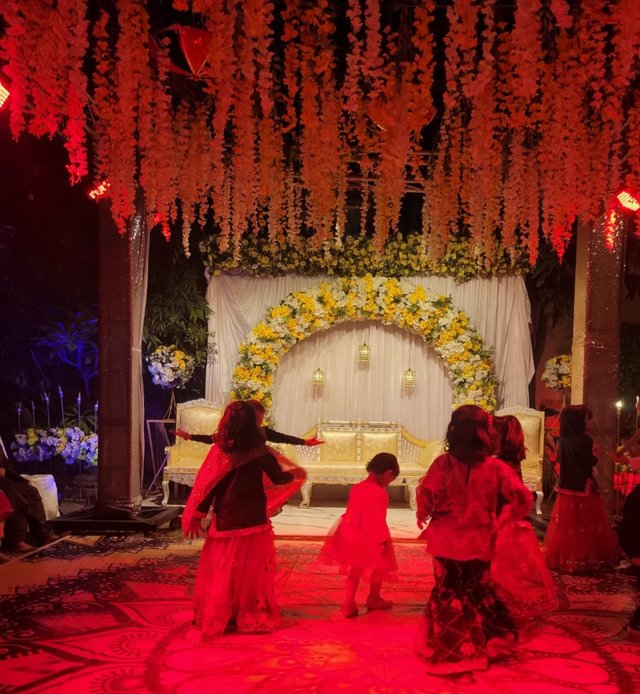
Pakistanis usually have 3-4 events in any wedding - Mayoon, Mehndi, Barat, Walima.
The first two events are considered bride-ish, so are mostly only celebrated by the bride-side. If the groom's side wants, then they can have their own separate events at their place.
If Nikkah(will explain later) is performed before the wedding, then the couple can have a joint event for Mehndi.
Mayoon and Mehndi are a cultural gift, not allowed in Islam according to some scholars.
Since we were the groom's family, we decided to skip the first two events because my brother (the groom) H also wasn't very keen on having unnecessary events.
But as the wedding days neared, my mom couldn't hold it anymore and poured out her heart's desire to have all the events to which my brother agreed, probably because he was starting to have fun.
A week before the wedding, we rented a dholki (two-headed hand drum). It's an art to make rhythmic and dulcet beats out of it which I can never learn. Even my 3 year old played it better than me.
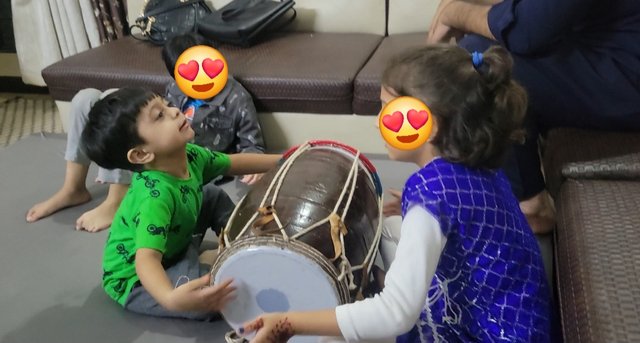
Every night, we used to sit down around the dholki, one of us would beat the drum and the rest of us sang tappay (Punjabi wedding songs). I belong to a Pubjabi family.
In the olden times, a shy groom would be sitting in the center but H was laughing at our choice of songs and recording the fun.
Sometimes, when we didn't know what to sing or got tired, we switched to playing tappay on Youtube.
This video is from 90s I guess which captures the whole vibe of pre-wedding shenanigans. I couldn't find the perfect English translation for this song. If anyone wants, I can translate on demand. Having said that, it hits differently in Punjabi.
These unofficial and low-key dholki nights were followed by Mayoon which was also kept small and private.
Mayoon is a pre-wedding ceremony in which turmeric paste is applied on the bride or groom's skin which is supposed to enhance their beauty.
We smeared big dollops of turmeric paste on H's face and arms. My kids went overboard and stained his clothes and messed up his hair. Since the event was kept private and small as per H's wishes, we all had more fun.
The next event was Mehndi. Before I dive deeper into my story, I want you to familiarize yourself with the origin and significance of this event.
Mehndi—or mehendi or henna—is an ancient form of body art, originating in India and across South Asia and the Middle East. A mehndi party is a pre-wedding celebration in Hindu and Sikh culture; during this event, the bride has a red-orange mehndi "stain" applied to her palms, the back of her hands, and her feet.
Traditionally, the mehndi night is meant to be organized before the big day to keep the bride's stress level under control. The green mehandi paste is applied to the hands and feet, which house the nerve endings in the body, to help calm the bride's nerves. While having the elaborate designs etched onto the limbs ensures that the bride has to switch off from her gadgets and just be in the moment today, originally, it signified her confinement to her home until the wedding. Of course, this can be dismissed as a superstition, but the idea behind the custom was to keep the bride-to-be safe and rested before her big day. Mehandi is also a part of the solah shringar (16 steps) recommended by ancient texts to get the bride ready for her new life. Not only is it considered to bring luck, joy, and beauty, but its scent is also said to have aphrodisiac properties.
As you can assess, it's more of a bride's event but the groom's side also celebrates in the same spirit.
On H's mehndi, a relatively larger number of guests were invited - all extended family and a few neighbouring families. All the arrangement was done in the garden of my parent's home. We hired some event organizers, who came early that morning and worked all day - erecting fixtures, fabricating a canopy, adorned with beautiful flowers, hanging over the platform, constructed for rasams and dance. The guys changed the whole look of the garden.
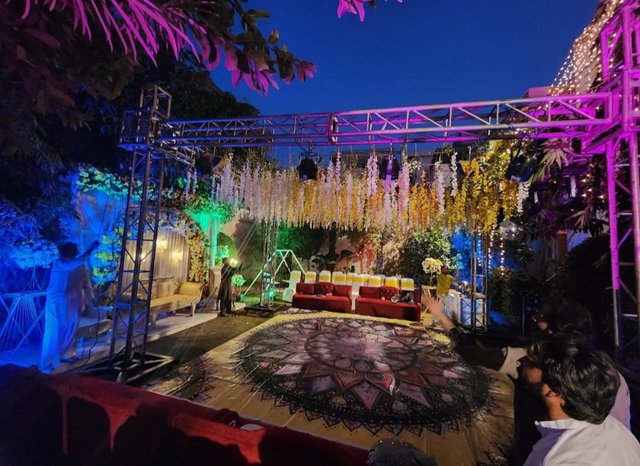
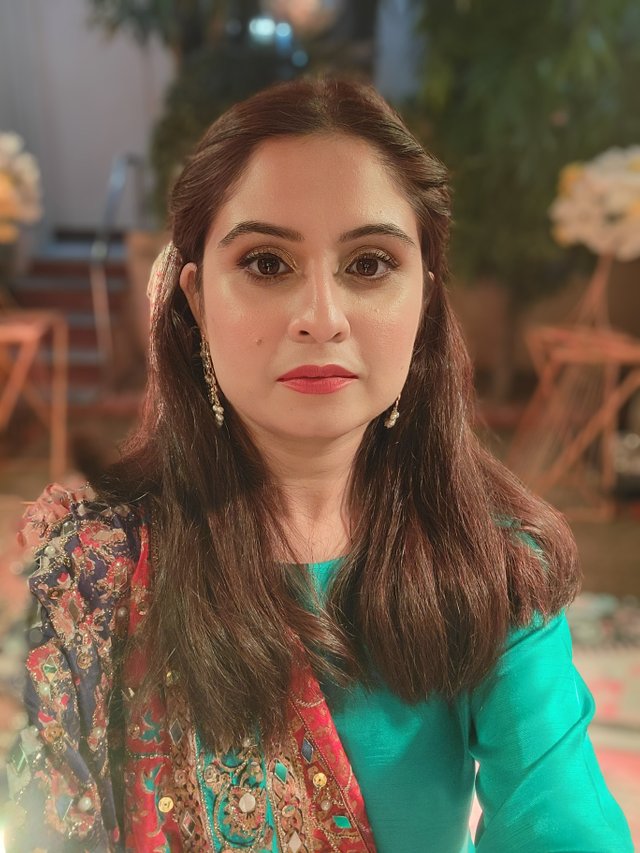
When the guests arrived, all the brothers and male cousins entered the premises with the groom and walked him to the stage.
It's a tradition that all sisters, female cousins and kids bring decorative plates of henna with lit candles to the platform/stage where the groom or bride is sitting. We did the same when H settled himself down on the stage. I was the only sister, so I brought the largest thaal (plate).
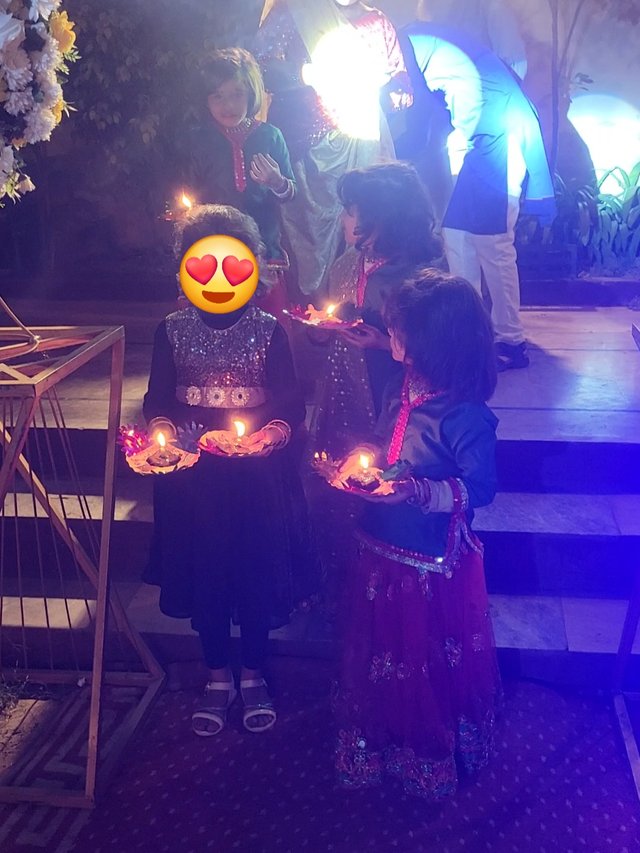
As part of the mehndi rasam, we applied henna on H's hand - not exactly on his hand, he had a 10 rupee note in his palm where everyone applied henna. His hair were oiled too. All the guests came one by one to him, did henna and oil rasam, made him take a bite of sweets (he doesn't like sweets so he mostly ate Crisps and Popcorns during the whole ceremony🤦♀️), and gave him salami (gift of cash).
Later in the night, dinner was served to the guests and everyone danced the night off.
The next day, it was Baraat - the actual wedding day.
That day, the groom gathers all his friends and family and goes in the form of a procession (Baraat) to bring the bride from her place to his place.
Since H's bride was from another city, we had to leave at dawn. Before leaving we did another rasam called Sehra Bandi.
The act of tying the sehra around the groom's head right before he leaves for the bride's house is called "Sehra Bandi".
A "sehra" is a forehead garland/nuptial crown worn by the bridegroom (or even bride in some cases) during weddings in the Indian subcontinent.
They are intended to ward off the evil eye. Secondly, the bride and groom are not supposed to see each other before their wedding ceremony.
It's the responsibility of the groom and his family to arrange transport for everyone going with the Baraat, if anyone needs it. We hired a coaster bus for those who didn't have personal vehicles. A dozen cars and one bus, all moved together in a line. It wasn't possible to move together on the highway but when we reached near the wedding hall - all the vehicles formed a line with the groom's car leading the rest.
When we arrived at the venue, booked by the bride's family - we saw hundreds of people waiting to receive us - bride's parents in the front. Everyone but bride.
What happened next...
Wait for another day or two to find out. (:
Ma sha Allah, evil eyes off💫
I thought our desi weddings start with an offended khala or phopho and the task to win over her to attend the wedding.
Or
A random big fight among family members for absolutely no reason but a mandatory ritual.
Never mind if that isn't the case there. Here those fights / phadday usually serve as background music than actual Tappay for dholki (it happens sometime).
I can relate. It seems more of an Okaraian trait. Believe me, no one fights on big days like my dad's side of family. Lol. But I love them to core.
So very true... 🤣🤣🤣
Pr Un k baghair ronaq bhi nai lagti!
Same, my dad's side😂
Bilkul G, asal ronak mela to in larai jhagroun m hi hota hai, shadi m kahan😂
Phadday aside - another big dilemma - "ladies not getting ready on time".
Of course there were some low-key phadday and undercover teeliyan by extended family but we focused more on enjoying and didn't give a damn to what others were saying. So did our parents. 😅
The only loud thing was my dad lecturing us to wind up the mehndi event at 10pm because we had to leave at sharp 6 next morning. Just for the record, we were in bed by 12:30am and left at 6:30am in the morning, like obedient kids. 😛
Hahahahha cool family😀
Desi dads and their obsession to reach on time (actually before 3hours of due time).
Once my father took us to the walima of our cousin exactly on time and when we reached there, they were busy in chairs and tables setting, literally.
It is embarrassing sometime😶
We support quality posts and good comments posted anywhere and with any tag.
Curated by : @patjewell
Always thankful💫
You took me back to my mehndi
I had such "cold feet," both due to nerves and the fact that I was sitting in an outdoor tent without any sweater or warm clothes on the foggiest and coldest night of December. Okay, we have less harsh winters, but it was 0 degrees Celsius that night. You can appreciate the spirit of sticking to the fashion of our Pakistani brides.
I enjoyed your detailed narration of mehndi events. Evil eyes off, you look so darn pretty in green dress. Though I have seen this photo of you before, but I can't help myself admiring you again.
May the groom and bride have an eventful and blessed married life. Ameen
Usually people get "cold feet" for other reasons on their Big Days. 😆
Not only the brides, all the lady guests in the weddings.🙊
I like my makeup in the photo(which I did myself) but not the picture. 😅
P.S. I love your mehndi look. Infact all your wedding looks. 😍
I'm interested in hearing the sound live. It must be quite loud and rhythmic to reflect the vibrancy and energy of pakistani weddings :)
You should attend a Pakistani wedding. (:
It was a far from boring read and I like the history most of all.
All the best for the newly weds!
We support quality posts and good comments posted anywhere and with any tag.
Curated by : @patjewell